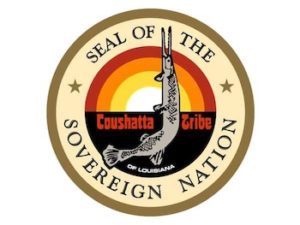
The Coushatta Seal
*The Coushatta Tribe of Louisiana is celebrated on this date in 1686. They are a Native American culture closely aligned with African Americans.
The Koasati (Coushatta) people are a federally recognized tribe living near Elton, Louisiana, in Allen Parish. The tribe has retained its Koasati language (all its members speak it), which is related to the Creek and Seminole tribes in Alabama. Many of the Koasati speak more than one Native American language. In a discussion of the area's indigenous history, it is important to note one visible and controversial aspect of New Orleans culture: Mardi Gras Indians. These are hierarchical “tribes” comprised of Black members participating in performances and parades during the Carnival season.
According to oral history, this tradition began in the eighteenth century and has several possible origins. Historically, local indigenous tribes hid runaway black slaves, and some people view Mardi Gras Indians as honoring the history of the two cultures. Others point to the collective racism and violence that Black and Indigenous communities faced as a shared experience. However, because of the exaggerated costumes meant to mimic some traditional indigenous dress and the usage of “tribes,” there is a question of whether this is cultural appropriation.
Currently, the tribal members work and live much as their Black, Anglo, and Cajun neighbors but retain their government, kin groupings, arts, and crafts. They are nationally recognized for their pine straw basketry and continue making split cane baskets in their traditional forms. They also maintain active music, foodways, and storytelling traditions.
Hiram F. "Pete" Gregory of Northwestern State University mentions Tonight, I'll tell you all how we got the name Koasati. Koasati means "lost tribe." When we lived around the Alabama area a while back, our tribe decided to move. But it was decided that the whole tribe could not move together at once. So the council decided that part of the tribe would go ahead of us, and the second group would follow after tying up loose ends. So, the first group took off and left some signs for the other group to follow. And maybe a week or so afterward, the second group followed. And they followed the signs, I guess, halfway up to the Mississippi River. But they lost it right after that.
To this day, we don't know what happened to the first group, but we assume they got swept up- maybe in a trail of tears movement- and moved to Oklahoma. But we don't know where they are today -- to this day. But our second group, when they went to the Mississippi River, ran into some explorers who asked them who they were. But naturally, since they didn't understand the language, they said Koasa, which means "we are lost." So, up until that time, we don't know what name we went by, but the explorers wrote the name Koasati in their journals, so from that point on, we've been known as the Koasati, which means "lost people."